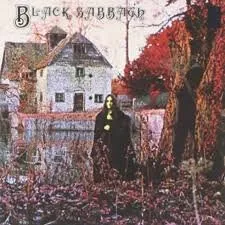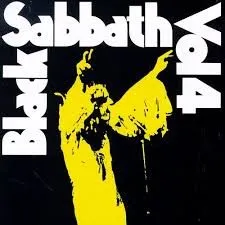Black Sabbath

In 1970 Black Sabbath released their self-titled debut album, the first heavy metal album ever. It was a commercial success but was also critically panned.
Side A has some of my favourite Black Sabbath tracks such as Black Sabbath, N.I.B. and Behind the Wall of Sleep. The opening track, Black Sabbath, is an ominous epic. This song is brilliantly dynamic, getting louder and quiter every so often. Iommi's guitar playing is pretty much perfect here, building in intensity with the other instruments throughout the song. I also love the end of this song, where finally the band is given the opportunity to go all out and play some fast and intense metal we expect.
N.I.B. has one of my favourite riffs, so simple, yet given so much importance thanks to Iommi's playing and the excellent guitar tone used. Like the rest of the album, Iommi's solos are amazing, blending perfectly with the rest of the song.
Unfortunately side B is a bit weaker than side A, Sleeping Village and Warning are good but notably weaker than the other songs. They still have fantastic solos though.
Black Sabbath is certainly not perfect, but it has some really fantastic songs, and its importance to music can not be understated. Iommi's guitar playing is the obvious highlight and Ozzy's unique vocal style adds to the doomy style of the album.
9/10
Paranoid

Easily the most famous Black Sabbath album, Paranoid was also released in 1970, just 7 months after the debut. Paranoid features two of Black Sabbath's most popular songs: Paranoid and Iron Man. It also features War Pigs, another of my favourites, which has some more amazing riffs and solos.
Planet Caravan is a very unique song, focusing on deeper, bassier sounds. It's quite a hypnotic song really. Electric Funeral has a really cool and interesting guitar tone and Rat Salad is a fun instrumental song.
Paranoid is an improvement on Black Sabbath by a little bit, thanks to a greater average quality of songs.
9/10
Master of Reality

Released the following year, in 1971, Master of Reality is definitely my favourite Black Sabbath album. This album has by far the best guitar tone of all their albums. Sweet Leaf and Children of the Grave are heavy metal masterpieces, each 5 minutes full of flawless riffing, sick solos and crazed vocals.
Solitude is also great, showcasing Ozzy's traditional singing skills (they're really impressive) and serving as a break from the crushing riffs of all the other songs. It's an awesome album and one I keep revisiting.
10/10
Vol 4

Vol 4, released in 1972 is a great time, but a bit derivative of what's come before. As always, the first track is amazing (Black Sabbath really know how to open an album, don't they?) and the other songs are great too. Vol 4 falters a bit in that it overall just has slightly weaker average song quality. Supernaut and Cornucopia are both great, but not too special. Snowblind is the exception here, a fantastic traditional Black Sabbath effort with a contagiously catchy main riff. Laguna Sunrise is similar to Solitude from Masters of Reality, a slow, calming song, serving as a break from the heavy metal of the rest of the album. It's great.
8/10
Sabbath Bloody Sabbath

Released in 1973, Sabbath Bloody Sabbath marks a definite change in style. I don't know exactly what it is but this album just feels different. It's slightly weirder (Fluff and Who Are You? fit this bill for sure) and perhaps more introspective/thoughtful, with songs like Killing Yourself to Live and Who Are You?
In typical Sabbath form, it's filled to the brim with excellent riffs, A National Acrobat's one in particular is a personal favourite. Sabbath Bloody Sabbath's doomy riff starting at 3:20 is also fantastic. It's super heavy too.
9/10
Sabotage

To me, Sabotage, released in 1975, feels a bit softer than previous albums, leaning more towards hard rock than heavy metal. There are still plentiful heavy metal elements however, like the the excellent and slightly insane Megalomania. Some other highlights are Hole in the Sky and Symptom of the Universe. The rest of this album doesn't really stick out to me much. Like Vol 4 this is just a great album.
8/10
Technical Ecstasy

Technical Ecstasy was released in 1976, a time where Ozzy admits that he began losing interest in the band. This clearly shows in the album. While still good music, Technical Ecstasy lacks many elements that make Black Sabbath special. Uninspired riffs and a much lighter and rockier tone prevent this album from hitting the heights of earlier efforts, and it sinks into just being 'good', not really what you want from Black Sabbath, the grandfathers of metal.
This album gets a bad rap, but, while I don't like it that much, it's definitely not as awful as people make it out to be.
7/10
Never Say Die!

Never Say Die! (1978) does deserve it though. This album is just bland and boring and, in the case of a couple of songs (looking at you Johnny's Blade) is plain bad. I would never revisit any of these songs.
Never Say Die! isn't a bad album, but it's certainly not very good
6/10
Interestingly enough, Ozzy actually left and rejoined the band soon before the recording of this album, leading to difficult recording sessions. Then, in 1979, due to severe alcohol and drug abuse by Ozzy (and from everyone else, but very severely in Ozzy's case), Ozzy was fired from the band, ending the 70s and the first era of Black Sabbath.
Thanks for reading!
Posted from my blog with SteemPress : https://www.atomcollectorrecords.com/blog/2019/07/23/black-sabbath-discography-review-part-1-the-70s/
